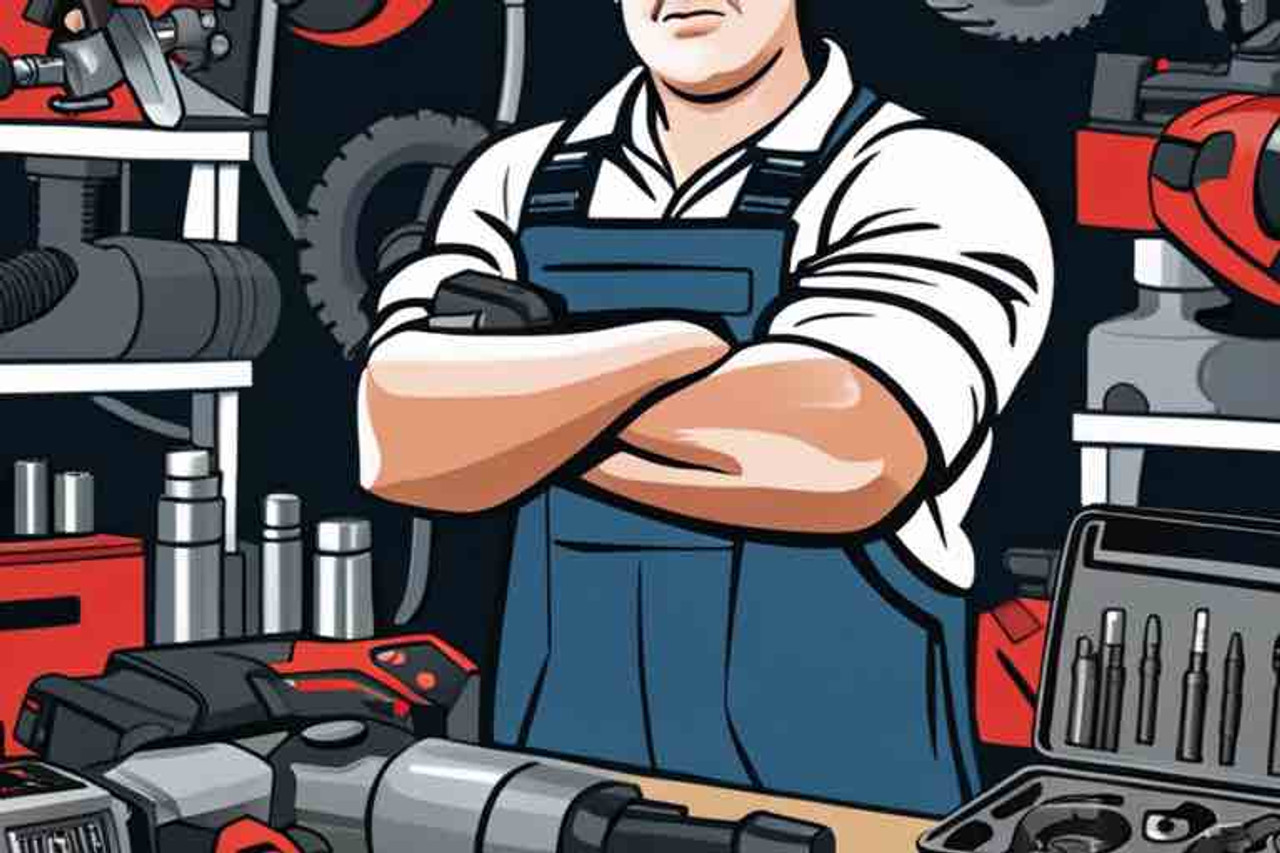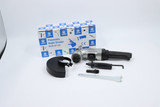10 Essential Air Tools Every Mechanic Needs for Automotive Excellence
10 Essential Air Tools Every Mechanic Needs
Air tools are a game-changer in the world of automotive repair. If you’re a mechanic looking to boost your efficiency, precision, and comfort while working, having the right air tools in your workshop is crucial. In this article, we’ll dive into the top 10 essential air tools every mechanic should have, explaining why they’re important and how they enhance daily tasks. Whether you’re a seasoned professional or just starting, these tools will make a massive difference in your work.
here’s a table summarizing the key advantages of air tools over manual and electric tools:
| Aspect | Manual Tools | Electric Tools | Air Tools |
| Power Output | Low | Moderate | High |
| Durability | High | Moderate | Very High |
| Weight | Heavy | Heavier due to batteries | Light |
| Safety | Limited electric risks | Risk of electric shock | Lower risk, better in damp areas |
| Maintenance | Low | High | Moderate (requires lubrication) |
| Versatility | Limited | High | Very High |
Why Air Tools Are Crucial for Mechanics
Air tools powered by compressed air, are often lighter, more powerful, and longer-lasting compared to their electric counterparts. Their robust power output and ergonomic designs reduce strain on mechanics and increase efficiency. Let’s explore why every auto repair shop should have the right set of air tools:
1. Boosted Productivity and Efficiency
Air tools operate at much higher speeds and power than manual tools, enabling mechanics to complete tasks such as loosening bolts, cutting metal, or drilling holes in a fraction of the time. Tools like pneumatic drills and impact wrenches can save hours, boosting productivity and allowing more vehicles to be serviced daily.
2. Enhanced Precision and Accuracy
Air tools allow for a level of control that manual tools simply cannot match. For example, air drills and air-powered ratchets help with precise tasks in hard-to-reach areas. This precision is especially important when working with small or delicate components, such as bolts in tight engine compartments or undercarriage fittings.
3. Improved Safety and Ergonomics
Air tools are often designed with ergonomics in mind, reducing fatigue and the risk of injuries for mechanics. They require less physical exertion, lowering the strain on muscles and joints. Pneumatic lifts, for example, reduce the risk of back injuries by taking over the heavy lifting tasks.
4. Versatility and Adaptability
Mechanics work with diverse vehicle types, each requiring a specific set of tools. Air tools offer versatility—adjustable torque settings, different attachments, and compact designs make them adaptable to various tasks, from drilling to sanding and greasing.
5. Cost-Effectiveness and Durability
Though air tools may require a significant initial investment, they are cost-effective in the long term. Built to withstand heavy use, air tools are known for their durability and typically require less maintenance than electric tools, providing a high return on investment for workshops.
Readers like:
Why mechanics Use air powered tools and other tools worth having
The 10 Essential Air Tools Every Mechanic Should Own
Here is a list of the top 10 air tools that are essential for every mechanic’s toolbox:
1. Air Impact Wrench
An air impact wrench is crucial for loosening and tightening stubborn bolts and nuts, which is common when working on suspension systems and changing tires. It delivers a powerful torque with minimal physical effort, making it a time-saver for any mechanic.
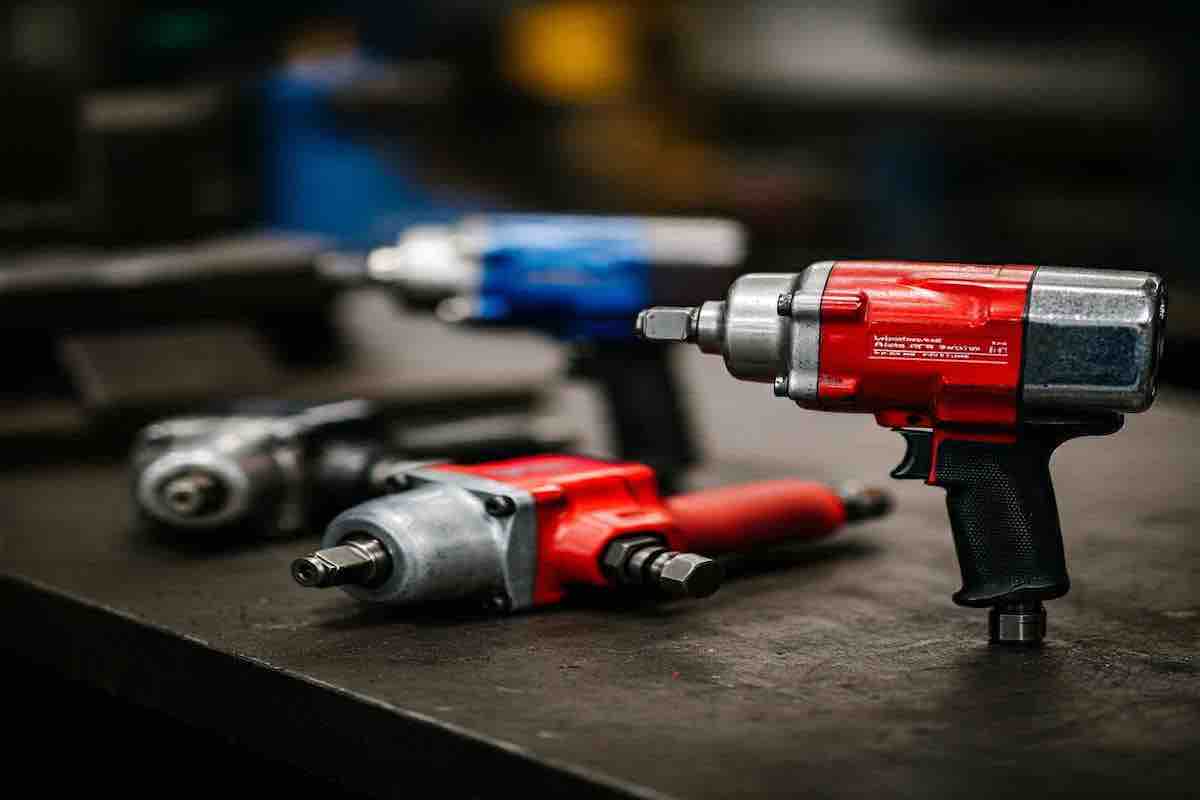
| Feature | Details |
| Torque Range | Up to 1,000 ft-lbs |
| Weight | 5-10 lbs |
| Use Cases | Tire changes, engine repairs |
- Use Case: Removing or tightening wheel nuts, engine work, and suspension repairs.
- Benefits: Speed, power, and ease of use, particularly in heavy-duty automotive tasks.
2. Air Ratchet
An air ratchet is your best bet for confined spaces where an impact wrench won’t fit. Its compact head design allows you to work on bolts in hard-to-reach places, such as undercarriage components or engine compartments.
| Feature | Details |
|---|---|
| Max Speed | 150-300 RPM |
| Torque Output | Up to 90 ft-lbs |
| Key Benefit | Ideal for tight spaces |
- Use Case: Tightening bolts in narrow engine spaces.
- Benefits: Compact, easy to handle, and capable of delivering enough torque for medium-strength bolts.
3. Air Hammer
The air hammer is a versatile tool for cutting, chipping, or chiseling metal parts. It’s highly effective for removing rusted exhaust parts or old suspension components.
- Use Case: Cutting metal sheets, breaking up corroded bolts, and chiseling away rusted components.
- Benefits: Versatility in metal cutting and demolition tasks.
4. Air Compressor
An air compressor is the backbone of any pneumatic tool system. It provides the compressed air needed to power all your air tools, ensuring smooth and efficient operation.
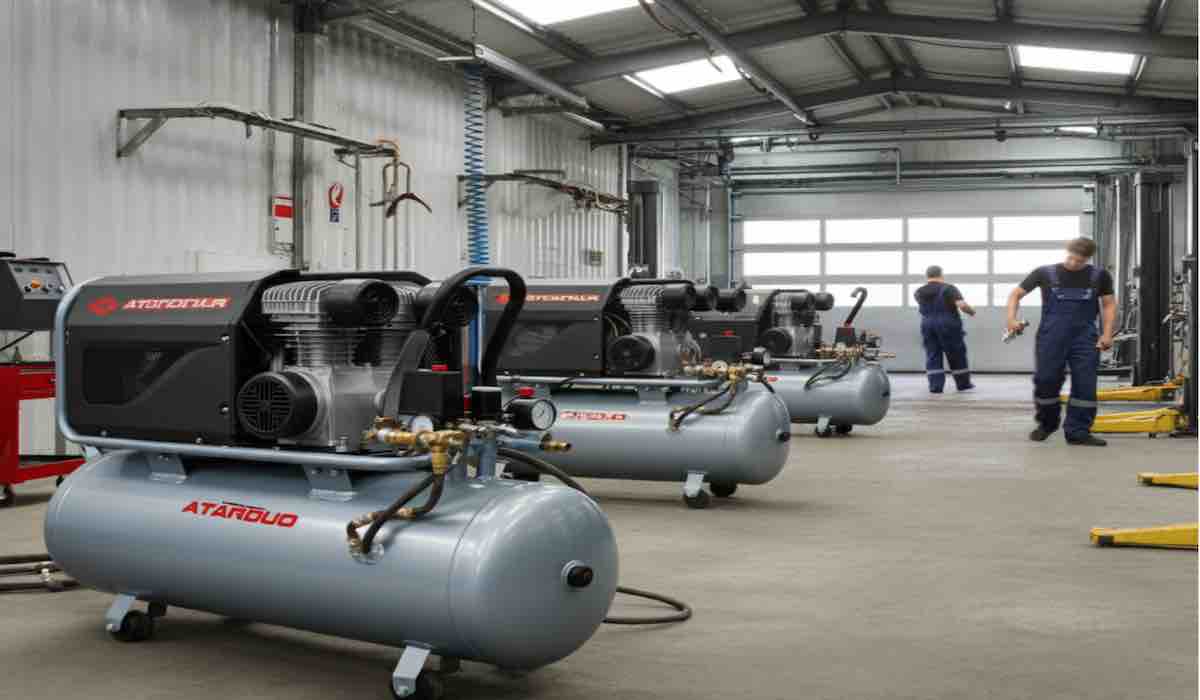
| Feature | Details |
|---|
| PSI Range | 90-150 PSI |
| Use Cases | Powers multiple air tools |
| Tank Capacity | 5-20 gallons depending on needs |
- Use Case: Powering various air tools, inflating tires, and cleaning parts.
- Benefits: Consistent air supply for all tools, enhancing workflow efficiency.
5. Air Drill
An air drill offers more power and better speed control than an electric drill. It’s suitable for drilling into different materials, including metal, wood, and plastic, providing versatility for a range of tasks.
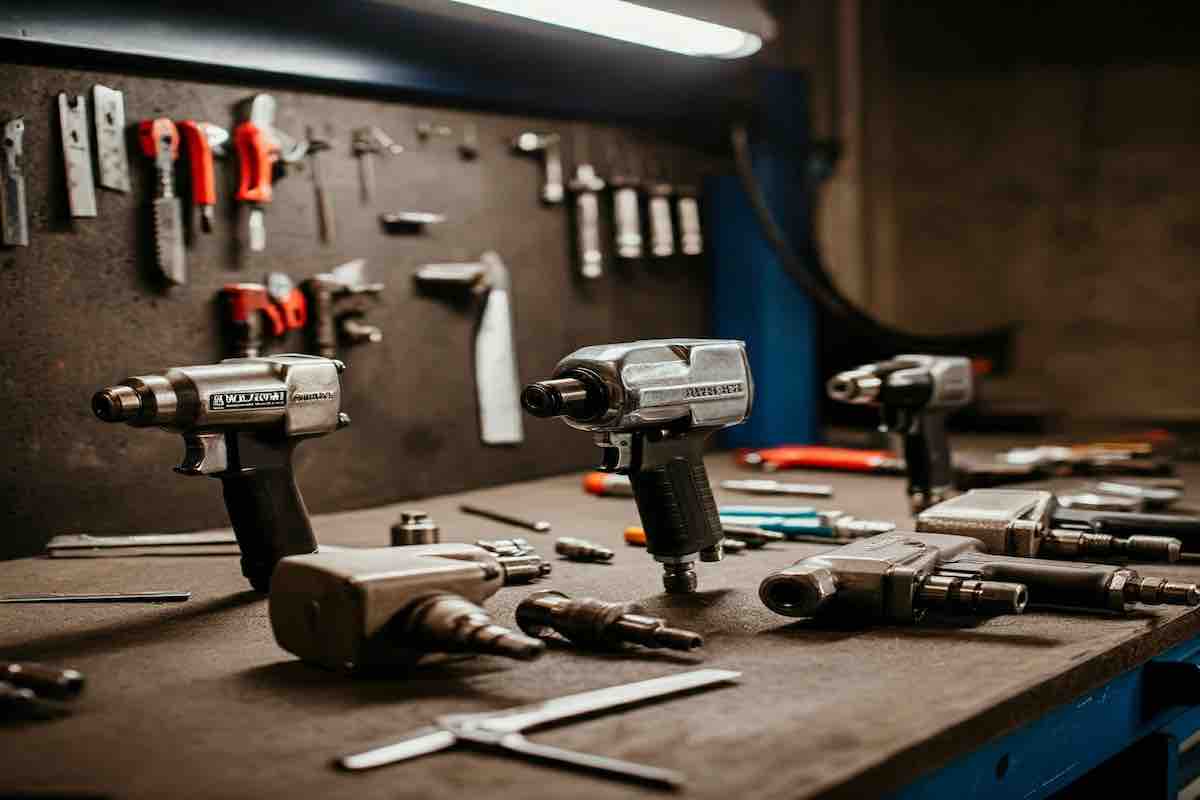
- Use Case: Drilling holes in engine blocks, body panels, and wooden components.
- Benefits: Lightweight, high-speed drilling, suitable for heavy-duty tasks.
6. Air Die Grinder
An air die grinder is perfect for grinding, polishing, or cutting metal surfaces. Its compact size and powerful motor make it ideal for precision work, such as removing rust or smoothing edges.
- Use Case: Grinding down welds, polishing surfaces, and removing rust.
- Benefits: Versatile, compact, and effective for fine detail work.
7. Air Blow Gun
A simple yet highly useful tool, the air blow gun helps maintain a clean workspace by blowing away debris and dust from components and work surfaces.
- Use Case: Cleaning workspaces, engine components, and hard-to-reach areas.
- Benefits: Quick cleaning, ensures a tidy and safe workspace.
8. Air Sandblaster
Rust and paint removal is a major part of any mechanic’s job, and an air sandblaster makes it easy to strip old paint, rust, or grime from vehicle parts, preparing them for refinishing.
- Use Case: Removing rust from car bodies and cleaning metal parts.
- Benefits: Efficient, fast removal of coatings, rust, and grime.
9. Air Grease Gun
Regular lubrication is key to keeping moving parts running smoothly. An air grease gun ensures that parts are properly lubricated without mess or excessive effort.
| Feature | Details |
|---|
| Pressure Output | 4,000-6,000 PSI |
| Use Cases | Lubricating vehicle joints |
| Efficiency | Applies grease in seconds |
- Use Case: Lubricating joints, bushings, and other moving parts.
- Benefits: Speedy lubrication, less physical effort, and consistent application.
10. Air Spray Gun
An air spray gun is used for applying paint or primer, ensuring an even coat and a professional finish. It's essential for any mechanic involved in cosmetic repairs or vehicle restoration.
- Use Case: Painting vehicle surfaces and applying primers.
- Benefits: Smooth, even application, resulting in a professional-looking finish.
Advantages of Air Tools Over Electric Tools
Many mechanics often wonder whether air tools are better than electric tools. Here are some reasons why pneumatic tools are favored:
- Increased Power: Air tools are generally more powerful and can handle tougher tasks compared to electric tools.
- Durability: Air tools have fewer moving parts and don’t overheat easily, which means they tend to last longer and need less maintenance.
- Weight and Ergonomics: Air tools are often lighter, making them easier to use for extended periods without causing fatigue.
- Safety: Since they don’t require electricity at the point of use, air tools are safer in damp conditions and pose less risk of electric shock.
To better visualize the benefits, here’s a comparison table between air tools and electric tools:
| Category | Air Tools | Electric Tools |
|---|---|---|
| Power Output | Consistently high | Limited by motor size |
| Weight | Generally lightweight | Heavier, especially cordless models |
| Durability | Fewer internal components—longer life | More components, subject to wear |
| Initial Cost | Higher due to compressor requirements | Lower initial cost, but higher for long term |
| Safety | Lower risk of electric shock | Risky in damp environments |
Readers like:
Why You should use pneumatic air tools? And not cordless and electric power tools?
FAQs About Air Tools
1. What Are Air Tools?
Air or pneumatic tools are devices powered by compressed air rather than electricity. They are popular in automotive, construction, and industrial applications for their reliability and power.
2. Why Should I Choose Air Tools Over Electric Tools?
Air tools are typically more durable, lighter, and offer greater power. They also produce less heat and are safer in damp environments compared to electric tools.
3. How Should I Maintain My Air Tools?
Regular maintenance includes cleaning, lubricating with air tool oil, and inspecting for wear. Before maintenance, always disconnect from the air supply.
4. Where Can I Purchase Quality Air Tools?
Quality air tools can be purchased from reputable suppliers like Tend Industrial Supplies LLC. For more details, visit their website at tendsupplies.com.
5. Are Air Tools Suitable for DIY Enthusiasts or Only for Professionals?
Air tools are preferred by professionals, but they are also suitable for DIY enthusiasts due to their efficiency and precision. They can make home projects faster and easier.
6. Why Is My Air Tool Losing Power?
Loss of power could be due to a clogged air filter, an air leak, or insufficient lubrication. Regular maintenance can help address these issues.
7. Can I Use Regular Motor Oil to Lubricate My Air Tools?
No. Air tool oil is recommended for use specifically for pneumatic tools. Motor oil can cause build-up and reduce the tool's performance.
Conclusion: Elevate Your Automotive Game with Air Tools
Air tools are indispensable for mechanics who want to work efficiently and effectively. The top 10 air tools listed above, including essentials like the Air Impact Wrench, Air Ratchet, and Air Compressor, offer immense value in a workshop setting. They save time, reduce the physical effort required, improve precision, and increase productivity.
Tend Industrial Supplies LLC is proud to offer a range of top-quality air tools to help you get the job done right. For more information or to explore our collection, visit tendsupplies.com or contact us at sales@tendsupplies.com.
Related Articles:
- Automotive Air Tools: A Complete Guide for Mechanics
- The Different Air Tools Used in an Automotive Workshop
- Top 5 Pneumatic Tools Every Mechanic Should Own


